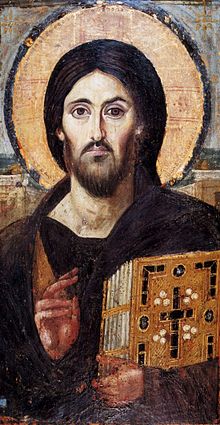|
|||
|---|---|---|---|
| This weekly bulletin insert complements the curriculum published by the Department of Christian Education of the Orthodox Church in America. This and many other Christian Education resources are available at http://dce.oca.org. | |||

In John 5:30-6: 2 Jesus establishes Himself as God's Son by calling the Father His witness: "If I bear witness to myself, my testimony is not true; there is another who bears witness to Me, and I know that the testimony which He bears to me is true." In an earlier verse (5:20) Jesus has stated that He "raises the dead and gives them life" and "judges all people." This authority has been given to Him by the Father, who loves Him and sent Him to the world. Like the Father, He is to be honored. Here is a major difference between Christianity and Islam. For Muslims, Jesus Christ cannot be the Son of God because that would require that God the Father had a wife: "And exalted is the Majesty of Our Lord: He has Taken neither a wife Nor a son" (Qur'an 72:3). But as Archbishop Hilarion writes in his book "The Mystery of Faith:" "...the Christ of the Gospels is simultaneously revealed as both God and man: all his actions and words are those of a human being which, nonetheless, are marked with the divine imprint. Jesus is born like all other children, but from the Holy Spirit and the Virgin rather than from a husband and a wife. Brought into the Temple like other infants, he is greeted by a prophet and prophetess who recognize him as the Messiah. Jesus grows and becomes strong in spirit while living at his parents' home, yet at the age of twelve he sits in the Temple among the teachers and utters mysterious words about his Father. Like others, he comes to be baptized in the Jordan, but at the moment of immersion the voice of the Father is heard and the Holy Spirit appears in the form of a dove" (p. 82). This description of Christ's baptism negates another Islamic claim, that Jesus could not be the Messiah about whom John the Baptizer prophesies. If He were, according to Islam, it would be unnecessary for Him to be baptized by an inferior. But the Father's voice and the Holy Spirit's appearance make the baptism one of the clearest Biblical proofs of Christ's divinity. 
In the verses from John's Gospel, Jesus speaks of the "works which the Father has granted me to accomplish" (5:36). He has come to finish and complete the things which the Father has sent Him to do. Here is another difference from Islamic teaching. Badru Kateregga writes in his book "Islam and Christianity" that Muslims "do respect the Messiah, Jesus, profoundly, but they do not believe that he is, therefore, superior to all prophets. In fact, the Qur'an affirms that Jesus foretold the coming of the Seal of the Prophets [Muhammed]" (p. 47). But in His own words, Jesus tells us that He is not foretelling someone else's coming. Jesus is the One who IS foretold, by every Old Testament prophet and by the truly final prophet, John the Baptizer. |
|||
